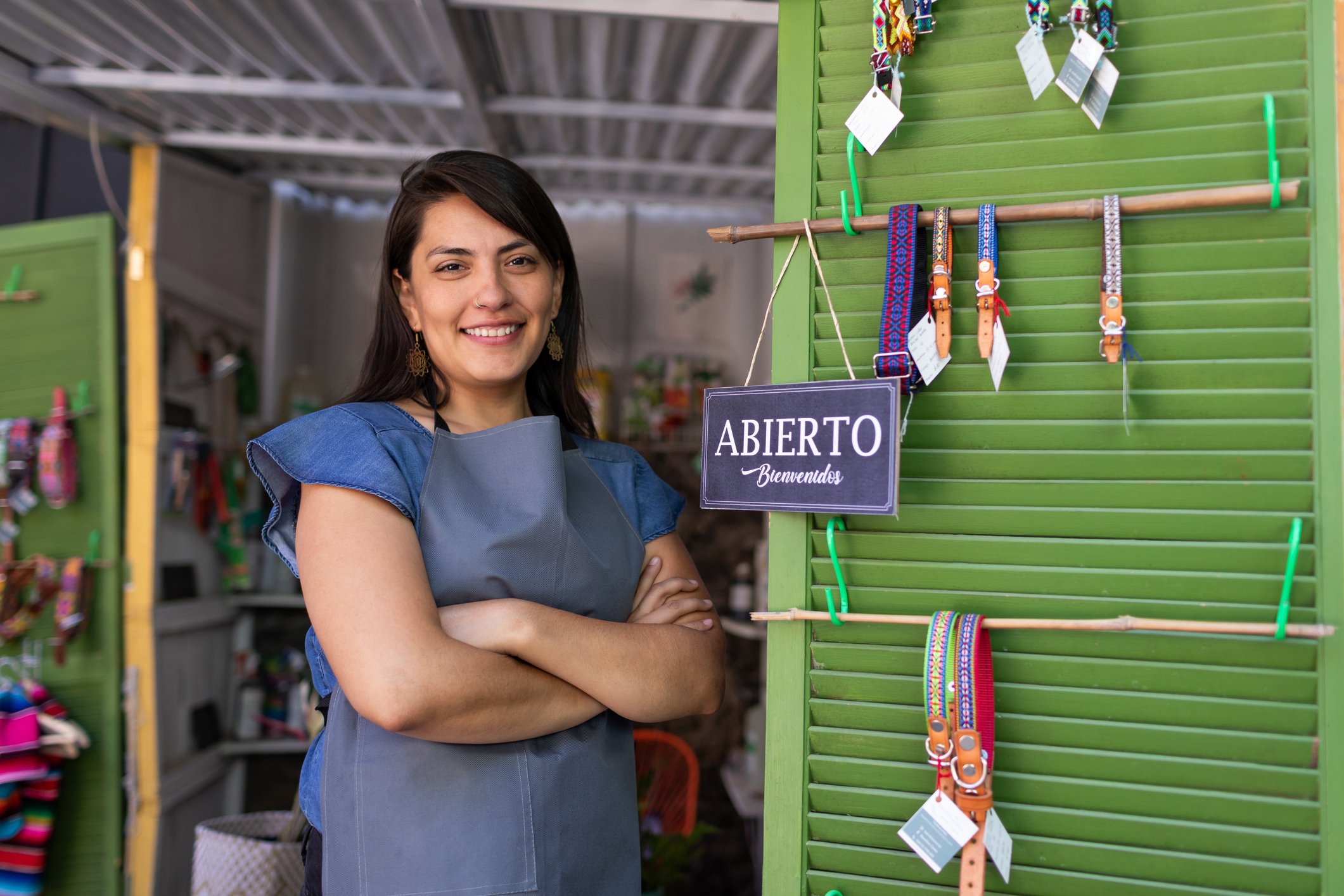
Business as Usual: Latina Entrepreneurs in Arizona Navigating the Postpandemic Economy
Introduction
Arizona is home to more than 700,000 small businesses, providing more than 1.2 million jobs and accounting for nearly 43% of the state’s private workforce.1 Arizona consistently ranks among the top states for launching new businesses thanks to affordable business costs, growing investment, and expanding innovation hubs. In 2024 alone, more than 128,000 new businesses were formed, reflecting the state’s thriving entrepreneurial climate.2 Women-owned businesses are a cornerstone of Arizona’s economy, accounting for about 46% of small businesses.3 These small businesses are central to Arizona’s economy, sustaining livelihoods for families and communities across the state.
This data brief draws on UCLA LPPI’s 2022–2023 state survey of small business owners in Arizona to examine how Latina entrepreneurs navigate capital access, pandemic recovery, disaster preparedness, and sustainability planning. The reference period overlaps with the most recent public data available from the U.S. Census Bureau and the U.S. Small Business Administration, providing a timely baseline at a moment when official statistics have yet to fully reflect post-pandemic conditions.4 While not statistically representative, the survey was designed to center on underrepresented entrepreneurs. This brief compares Latina, white, and all women-owned businesses in the Arizona sample (see Appendix 1 for details). The data show that Latinas face greater barriers to capital and resilience planning than their peers.
Why This Matters for Arizona’s Women-Owned Small Businesses
Research has shown that minority entrepreneurs are less likely to be approved for loans than equally creditworthy counterparts.5 When loans are approved, they often carry higher interest rates6 and their loan size is smaller,7 particularly for Black business owners.8 These financing gaps can limit their opportunities to grow, weather economic downturns, and reinvest in their communities. The COVID-19 pandemic further exposed and deepened these challenges. Early rounds of the Paycheck Protection Program—the primary federal relief effort for small businesses—failed to reach many smaller firms and disproportionately missed minority and women-owned businesses.9 Women-owned firms also experienced larger drops in sales than male-owned businesses.10 Limited access to this critical relief slowed recovery and left many small women-owned firms more financially vulnerable during this period of severe disruption.
Today, small businesses are navigating new pressures from rising costs and increasingly severe weather events such as floods and heat waves. A Federal Reserve survey found that by 2020, one-third of businesses had already observed climate-related impacts on revenues, costs, or investments, and most expected these impacts to grow.11 These impacts can heavily impact small entrepreneurs with fewer financial resources to implement sustainability measures or recover from disasters. Despite these challenges, most research on environmental risks focuses on large corporations, offering little insight into how small, women-owned businesses approach disaster preparedness and long-term planning. Studies abroad suggest that access to sustainable practices and strong regulatory enforcement can spur small businesses to adopt greener practices (e.g., increased recycling),12 but U.S. research remains limited. Filling this gap is critical: Understanding how Latina entrepreneurs navigate both financial and climate pressures is key to building Arizona’s long-term economic resilience.
Key Findings
Key Finding 1: Access to sufficient and affordable financing remains a top challenge for Latina-owned businesses in Arizona.
Prior to the COVID-19 pandemic, nearly one-third (32%) of surveyed Latina-owned businesses reported difficulty accessing capital, a share slightly higher than the share for all surveyed women-owned businesses (30%) and notably higher than the share for white-owned businesses (25%). Figure 1 displays the types of capital access challenges business owners reported experiencing (for those who reported facing any challenges). The most common barrier was insufficient capital, reported by 71% of surveyed Latinas versus 54% of white women. The largest disparity between Latinas and white women was in credit scores: 35% of surveyed Latinas cited low or poor credit as a barrier, nearly double the rate of white women (19%). Overall, these findings indicate that Latina‑owned businesses face greater barriers to securing sufficient and affordable capital for their businesses compared to white women‑owned businesses.
Figure 1. Capital Access Barriers Reported by Women-Owned Businesses in Arizona
Source: LPPI analysis of original survey data collected by WestGroup Research from November 2022 to September 2023. Asked only of respondents who reported facing challenges obtaining funding/capital for their business. Multiple answers allowed; shares are based on the number responding yes/no to each challenge, excluding NA.
Key Finding 2: Latina-owned businesses were hit harder by the COVID-19 pandemic and remained more financially vulnerable after the crisis.
We asked respondents to describe the impact that COVID‑19 had on their businesses. As reported in Figure 2, about 30% of surveyed Latina-owned businesses reported that the pandemic had a “large negative effect” on their operations, compared to 24% of white women-owned firms. Looking ahead, Latinas were also more than twice as likely to anticipate needing financial assistance in the next six months (28% vs. 11%) as part of their ongoing recovery from the pandemic. Together, these findings highlight both the depth of pandemic-related losses and the persistent financial vulnerability among Latina-owned businesses.
Figure 2. Pandemic Impacts and Recovery Needs Reported by Women-Owned Businesses in Arizona
Source: LPPI analysis of original survey data collected by WestGroup Research from November 2022 to September 2023. Respondents were asked: “Please indicate the extent to which the pandemic has impacted your business” (share reporting a “Large negative effect”) and “In the next six months do you think your business will need to do any of the following?” (share indicating “Obtain financial assistance or additional capital”).”
Key Finding 3: Latina-owned businesses are more likely to recognize climate change as a business risk.
Surveyed women entrepreneurs were asked whether climate change—defined in the survey as increased vulnerability to wildfires, drought, and extreme weather events—had affected their firm’s revenues, costs, investments, or worker safety. Nearly 19% of women respondents reported that climate change had already created observable impacts on their business. Looking ahead, 42% of surveyed Latina-owned businesses ranked climate change as a high or medium business priority, compared to 30% of white women-owned firms (see Figure 3). This stronger perception among Latinas suggests a heightened awareness of how climate risks, ranging from operational costs to worker health and safety, could affect their ability to sustain and grow their businesses.
Figure 3. Climate Change as a Business Priority Reported by Women-Owned Businesses in Arizona
Source: LPPI analysis of original survey data collected by WestGroup Research from November 2022 to September 2023 to the following question: “Relative to other business risks, what level of priority would you give to risks arising from climate change?” (share reporting high or medium priority).
Key Finding 4: Most women-owned businesses have at least one disaster safeguard, but comprehensive preparedness remains limited.
We asked women-owned businesses in Arizona about uptake in three common emergency preparedness measures: insurance coverage, structural protections of their business (e.g., flood- or wind-proofing), and access to a back-up generator to keep the doors open in case of power outage. Figure 4 displays the share of all women-, Latina- and white-owned businesses without each safeguard. More than three quarters of all women lacked structural protections for their facility (76%) and about two thirds of all women lacked access to a generator (67%).
Creating a combined indicator, we found that three in four women-owned businesses surveyed (77%) had at least one safeguard in place, with similar rates among Latina (75%) and white women (80%) business owners. However, few women-owned businesses reported multiple protections: about 40% reported just one safeguard, while only 11% had all three. These findings point to important similarities across women-owned firms in Arizona: While most businesses have taken some action toward disaster readiness, significant gaps remain in the breadth of their preparedness. This pattern is consistent with LPPI’s broader research on Arizona’s small businesses, which found that many small businesses remain vulnerable to future crises.13
Figure 4. Share of Women-Owned Businesses Without Disaster Protections in Arizona
Source: LPPI analysis of original survey data collected by WestGroup Research from November 2022 to September 2023 to the following questions: “Do you have flood, earthquake, or fire insurance for your business?”; “Have you taken action to flood-proof or wind-proof your facility?”; and “Have you obtained a generator(s) for your business if electrical power fails?”
Note: “No” and “Not sure” responses are combined, because both indicate lack of confirmed preparedness.
Key Finding 5: Latina-owned businesses are more likely to recognize the importance of environmental sustainability planning.
Among all surveyed women-owned businesses in Arizona, one-quarter (24%) reported that they already have a sustainability plan or are currently developing one. A larger share of Latina-owned businesses expressed intent to develop a plan in the future (28% vs. 18% of white women). By contrast, white women-owned businesses were more likely to report no anticipated need for a plan (56% vs. 47%). These findings suggest that Latina entrepreneurs may be more attuned to the importance of sustainability planning and more likely to act on it, even if they currently lack the resources to do so.
Figure 5. Sustainability Planning and Intent Reported by Women-Owned Businesses
Source: LPPI analysis of original survey data collected by WestGroup Research from November 2022 to September 2023 to the following question: Which of the following best describes your business’ position regarding having a formal environmental sustainability plan? May not add to 100 due to rounding.
Conclusion
This data brief highlights both persistent barriers and emerging priorities for Latina entrepreneurs in Arizona. The findings show that Latina business owners reported greater difficulty securing affordable capital prior to the pandemic, more severe pandemic impacts, and higher anticipated needs for future assistance. At the same time, they were more likely to view environmental risk as a business risk and to express intent to adopt environmental sustainability planning. These findings highlight both the vulnerabilities that constrain business stability and the readiness of Latina entrepreneurs to engage in forward-looking strategies when given adequate support. In today’s uncertain economy marked by inflation, higher borrowing costs, and market volatility, supporting the resilience of women and Latina-owned businesses is especially important for ensuring long-term economic stability. As Arizona continues to position itself as a small business hub, ensuring that all women-owned businesses are supported through targeted investments, accessible capital, and culturally relevant outreach will be critical not only for economic vitality today, but for strengthening resilience when the next economic crisis starts.
Endnotes
1 U.S. Small Business Administration. 2025. 2025 Small Business Profile: Arizona (June).available online.
2 Nicole Garcia, “Studies Rank Arizona as Among the Best States for Entrepreneurs to Start a Business,” Arizona Corporation Commission, January 30, 2025. available online.
3 U.S. Small Business Administration. 2025. 2025 Small Business Profile: Arizona (June).available online.
4 For public dataset on small businesses, see.
5 Timothy Bates and Alicia Robb. 2015. “Has the Community Reinvestment Act Increased Loan Availability among Small Businesses Operating in Minority Neighbourhoods?” Urban Studies 52, no. 9 (July 1): 1702–21.available online.
6 Timothy Bates and Alicia Robb. 2013. “Greater Access to Capital Is Needed to Unleash the Local Economic Development Potential of Minority-Owned Businesses.” Economic Development Quarterly 27, no. 3 (August 1): 250–59. available online.
7 Timothy Bates and Alicia Robb. 2016. “Impacts of Owner Race and Geographic Context on Access to Small-Business Financing.” Economic Development Quarterly 30, no. 2 (May 1): 159–70. available online.
8 Ibid.
9 Anneliese Lederer and Sara Oros. 2020. Lending Discrimination within the Paycheck Protection Program. National Community Reinvestment Coalition. available online. Sergey Chernenko and David Scharfstein. 2024. “Racial Disparities in the Paycheck Protection Program,” Journal of Financial Economics 160:10391, October.available online.
10 Nicholas Bloom, Robert S. Fletcher, and Ethan Yeh. 2021. The Impact of COVID-19 on US Firms, NBER Working Paper No. 28314. National Bureau of Economic Research, January.available online.
11 Hishgee Jargalsaikhan, Sylvain Leduc, and Luiz E. Oliveira. 2022. Appendix: Business Survey on Climate-Related Risk. Federal Reserve Bank of San Francisco, March 21. available online.
12 Ibid.
13 Julia Silver, Vivian Vanessa Cruz, and Rosario Majano. 2024. “3 Facts to Strengthen Resilience for Arizona’s Small Businesses,” UCLA Latino Policy and Politics Institute, November 25. available online.
14 For public dataset on small businesses, see.
Acknowledgments
This data brief is part of The Equitable Recovery and Entrepreneurship Project (TEREP), an initiative of the UCLA Latino Policy and Politics Institute (UCLA LPPI) and the UCLA Center for Neighborhood Knowledge (UCLA CNK) that examines the experiences of entrepreneurs of color to inform strategies for small business resilience and equitable economic growth. The analysis presented here draws on data originally collected through this joint research effort.
This report was made possible by the generous support of JPMorgan Chase Global Philanthropy and The James Irvine Foundation. The authors would like to thank Rosario Majano, Chloe Cardenas, and Misael Galdamez from UCLA LPPI, and Chhandara Pech and Professor Paul M. Ong from UCLA CNK for their insightful feedback.
The UCLA Latino Policy and Politics Institute acknowledges the Gabrielino Tongva peoples as the traditional land caretakers of Tovaangar (the Los Angeles basin and the Southern Channel Islands). As a land grant institution, we pay our respects to the Honuukvetam (Ancestors), ‘Ahiihirom (Elders), and ‘Eyoohiinkem (our relatives relations) past, present, and emerging. The Arizona State University (ASU) Center for Latina/os and American Politics Research (CLAPR) acknowledges the 23 Native Nations that have inhabited this land for centuries. We recognize that Arizona State University’s four campuses are located in the Salt River Valley on the ancestral territories of the Akimel O’odham (Pima) and Pee Posh (Maricopa) Indian communities. As a public institution, we honor the sovereignty of these Nations and pay our respects to their Elders whose care and keeping of these lands allows us to be here today.
About the UCLA Latino Policy and Politics Institute
The UCLA LPPI addresses the most critical domestic policy challenges facing Latinos and other communities of color through research, advocacy, mobilization, and leadership development to expand genuine opportunity for all Americans.
About the ASU Center for Latina/os and American Politics Research
ASU CLAPR’s mission is to foster and support thoughtful, innovative research on the political and policy circumstances of the nation’s Latina/o-Hispanic (Latinx) population, thereby creating a fuller, deeper understanding of politics and governance in the United States.
Disclaimer
The views expressed herein are those of the authors and not necessarily those of the University of California, Los Angeles, or the Arizona State University as a whole. The authors alone are responsible for the content of this report.
© August 2025 by the Regents of the University of California, Los Angeles. All rights reserved. Printed in the United States.















